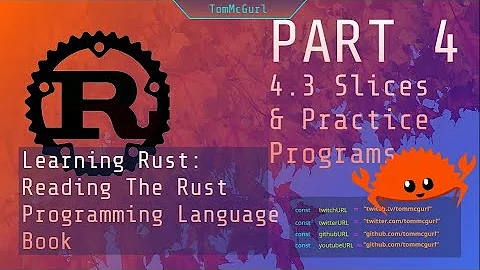Convert string slice to int in Rust
Solution 1
You can call str::parse(), but you need to make sure that read_line is working. We need a reader:
use std::io;
fn main() {
let reader = io::stdin();
}
stdin reads the global buffer that handles the input stream and also implements the BufRead trait which has the read_line method method. This takes a mutable String as an input buffer and reads all bytes from the stream until a newline byte is reached and appends them to the buffer. The #expect() method unwraps the Result; if it is an Err it will panic with the message and the cause.
use std::io;
fn main() {
let reader = io::stdin();
let mut input_text = String::new();
reader.read_line(&mut input_text).expect("failed to read line");
}
We now have the input text that we want to convert into an i32. This is where str::parse() will work for us, as long as we give it a type to parse to. str::trim() is necessary because read_line includes the newline byte the buffer
use std::io;
fn main() {
let reader = io::stdin();
let mut input_text = String::new();
reader.read_line(&mut input_text).expect("failed to read line");
let input = input_text.trim().parse::<i32>();
}
We're not done yet, we still need to ensure that we successfully parsed the input using pattern matching. All the code you need to convert your original input buffer into a usable integer is:
use std::io;
fn main() {
let reader = io::stdin();
let mut input_text = String::new();
reader.read_line(&mut input_text).expect("failed to read line");
let input_opt = input_text.trim().parse::<i32>();
let input_int = match input_opt {
Ok(input_int) => input_int,
Err(e) => {
println!("please input a number ({})", e);
return;
}
};
println!("{}", input_int);
}
This compiles without errors or warnings.
Solution 2
The input includes a newline at the end, as explained in the documentation for read_line. This causes from_str() to fail. Using std::str::trim() and changing this:
let input: Result<i32, _> = input_text.parse();
into this:
let input: Result<i32, _> = input_text.trim().parse();
seems to work.
Solution 3
As of Rust 1.14, The Rust Programming Language has this example:
let guess: u32 = guess.trim().parse()
.expect("Please type a number!");
You can also just use the same variable name again and the new type will "shadow" the old type:
use std::io;
fn main() {
let mut input_text = String::new();
io::stdin()
.read_line(&mut input_text)
.expect("failed to read line");
let input: u32 = input_text.trim().parse()
.expect("Please type a number!");
}
Solution 4
Try this:
fn main() {
let input_text = std::old_io::stdin()
.read_line()
.ok()
.expect("failed to read line");
let input_number: Option<i32> = input_text.trim().parse().ok();
let number = match input_number{
Some(num) => num,
None => {
println!("Wrong input data! Input a number.");
return;
}
};
println!("{}", number);
}
Related videos on Youtube
Comments
-
 Glen Swift 5 months
Glen Swift 5 monthsNote The code in this question pertains to a version of Rust before 1.0 but the answers have been updated for Rust 1.0.
I have trouble converting a string to an integer.
fn main() { let input_text = io::stdin() .read_line() .ok() .expect("failed to read line"); let input: Option<int> = from_str(input_text.as_slice()); println!("{}", input); }I enter a number on the console (42 for example) and my program prints
None.The documentation says that that is a normal situation when the string is ill-formatted, but what's wrong with my
42? -
 Shepmaster almost 6 yearsThis answer refers to the
Shepmaster almost 6 yearsThis answer refers to theold_iomodule, which is not available in Rust 1.0; this answer is no longer useful.


